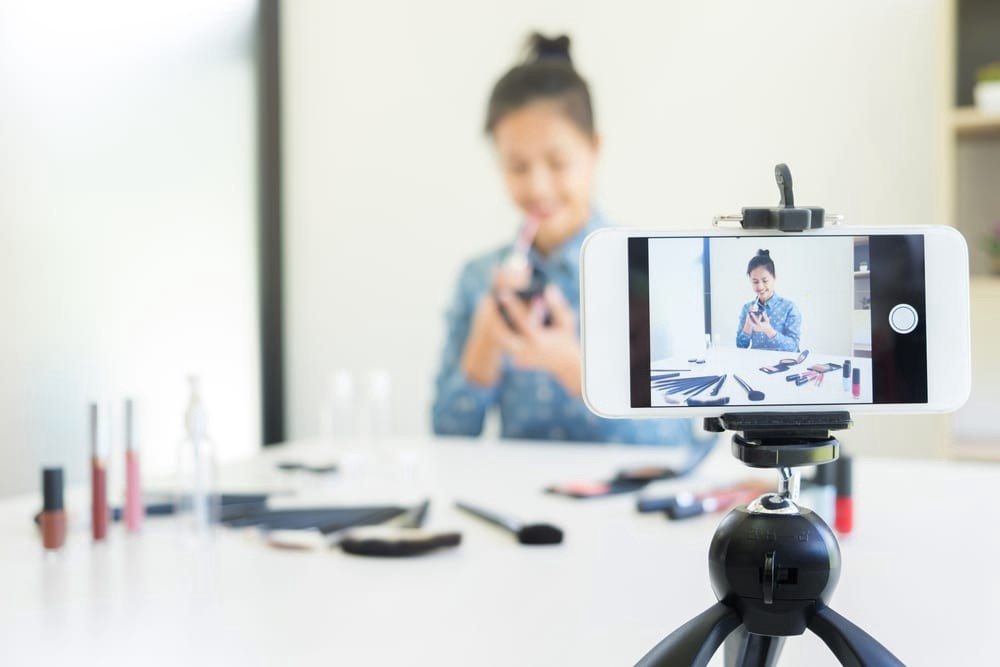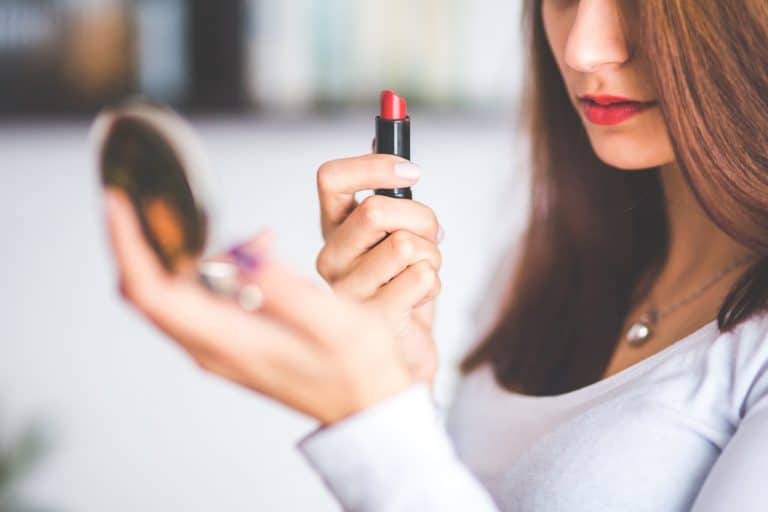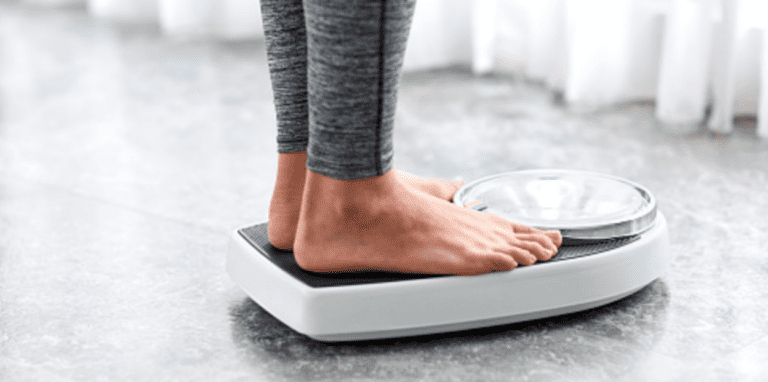The “beauty value” economy in China, known in Chinese as 颜值经济 (yán zhi jing ji) is a recent internet slang, in which “yan” means face and appearance, and zhi represents the value of a person’s appearance. Several psychological aspects of the “beauty value” economy in China make it so prosperous. Firstly, working on one’s own beauty can be addictive. A person who did some beauty procedures once will more likely do them again in order to keep the effect. Secondly, the “halo effect” in psychology claims that good-looking people usually form a good impression. Therefore, for some people, to invest in beauty is to invest in themselves.
This article defines “beauty value“ (颜值经济) as consumer industries developed for young people in pursuit of attractiveness. They include such spheres as makeup, skincare, medical beauty, photo editing apps and fitness. According to Euromonitor statistics, in the past fifteen years, the scale of China’s beauty market has doubled from 114.7 billion yuan in 2005 to 477.7 billion yuan in 2019, with a compound annual growth rate of 10.73%.
What is the “beauty value” economy in China?
The beauty economy is based on the assumption that in the era of social media appearance is becoming a valuable asset. Moreover, some studies show that good looking people tend to get more attention and opportunities in society. Namely, the “beauty value” economy is related to the concept of competitiveness. “Beauty value” embodies the economic spillover effect brought by its competitive advantage. In a country where people are expected to put their headshot photo on their CV, investment in appearance is perceived as an economic investment.
Research by economists Daniel Hamermesh and Jeff Biddle shows that a person with a below-average appearance earns 9% less salary per hour, while a person with an above-average appearance earns 5% more per hour, which is a 14% difference. Enlarged to a lifetime, the income gap between them may reach as much as 230,000 US dollars (1.5 million yuan). Another research paper from South Korea pointed out that highly attractive men earn 15.2% more than men with “medium beauty”, and highly attractive women earn 11.1% more than women with “medium beauty”.
“Beauty value” and influencers
There is an old Chinese saying: “Those who win the hearts of the people win the world.” Now this sentence has been reinterpreted by many people as: “Those who get good looks get the hearts of the people, and those who get the hearts get the world.” This is especially applicable to the influencers on social media. Many people see this as a dream job, and the attractiveness Is highly important in this sphere, which also contributes to the growth of the “beauty value” economy.
Key consumers of the beauty market in China
Millennials and Gen Z contribute to the growth of the “beauty value” economy in China
Nowadays, the beauty economy has rapidly developed targeting post 90s generation of millennials and Gen Z in China.
According to the survey, 59% of university students have a certain degree of appearance anxiety, of which women are more likely to be sensitive about it. However, many male students are very anxious about their appearance too. According to Huanqiu data, young Chinese people are willing to go further for beauty, and customers in the first-tier cities across the country are more likely to get medical beauty procedures. Moreover, more than 20% of young men in China are accepting medical beauty procedures and almost 50% of women also find it acceptable.
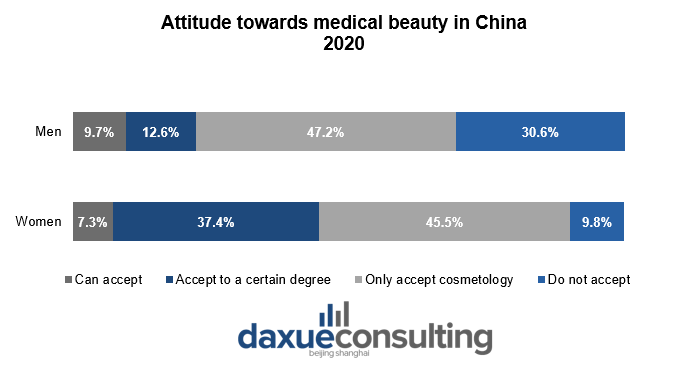
Male beauty is gaining more attention
In recent years, the “beauty value” economy in China is no longer focusing only on women. Researchers Jackson, Hunter, and Hodge found that stereotypes about the competence of attractive people are stronger for men than for women. Thus, decision-makers pay more attention to the male candidate’s appearance, promotion or salary increase. Therefore, more and more men are willing to increase their attractiveness through aesthetical medicine, make-up and skincare.
According to data from iResearch, in 2020, about 10% of the medical aesthetics consumers were male. Moreover, the retail scale of male beauty in China reached 15.8 billion yuan in 2019 and increased to 16.72 billion yuan in 2020. IiMedia Consulting analysts believe that men’s willingness to consume beauty and skin care products has continued to increase in recent years, and the male beauty market will continue to grow. According to the data of Tmall 618 in 2021, the sales volume of men’s makeup this year has increased by 40% compared with last year. In addition, the number of enterprises in China related to male skincare has shown a growth trend from 2016 to 2021, and the number of registered companies in 2020 reached 1,681.
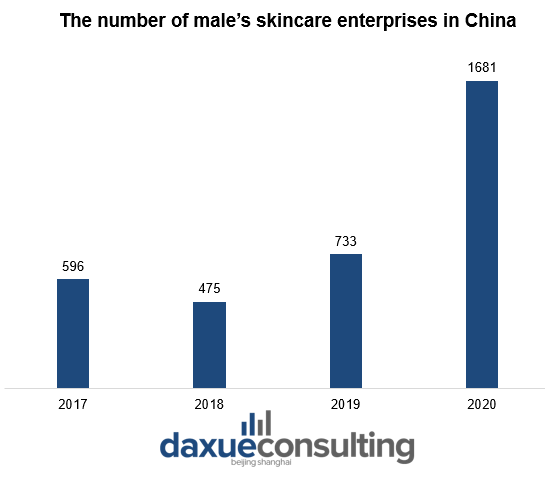
Medical beauty is becoming more common in the “beauty value” economy in China
The size of aesthetic medicine in China continues to expand, showing strong growth potential in the “beauty value” economy. According to Qianzhan statistics, the scale of China’s medical aesthetics market reached 176 billion yuan in 2019, with a compound annual growth rate of 22.2%, and it will reach 318.5 billion yuan by 2024.
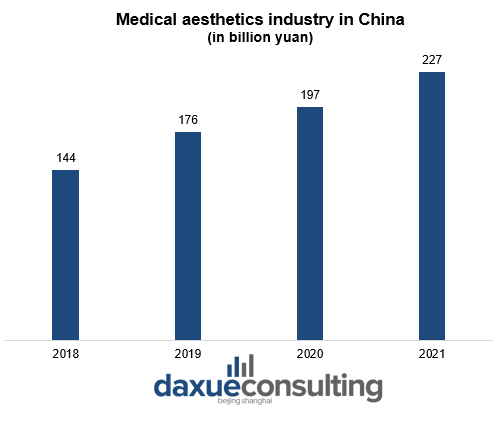
Such aesthetic medical procedures as hyaluronic acid injections, liposuction, teeth whitening and correction and hair transplantation became especially popular among Chinese people.
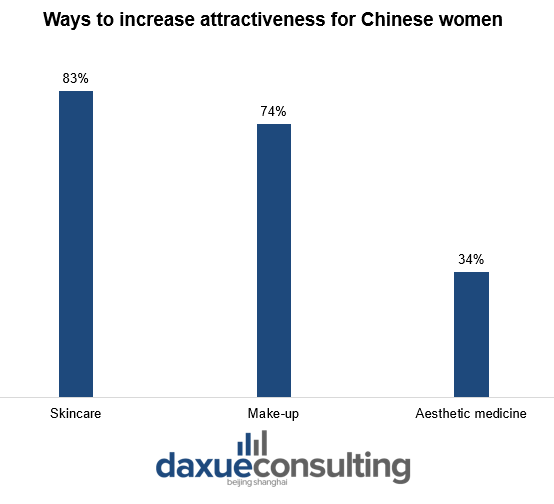
About 50% of Chinese consumers believe that being beautiful can make them happier. In addition, nearly 30% of medical aesthetics users choose it because they are driven by their friends or influenced by the “beauty-oriented society”.
Oral care market: dental cleaning and whitening
Today in Asia, teeth whitening is on the rise. According to some fashion magazines, having white and shiny teeth has become one of the criteria for measuring beauty. In China, surveys show that every fifth adult wants to whiten their teeth, as it adds some points to the overall “attractiveness index”. Therefore, the increasing of the “beauty value” economy may be an important growth point for oral medicine: according to iResearch’s data, in the continuous growth of oral care, the number of consumers for dental cleaning items accounts for 67%, and whitening accounts for 8%.
Skincare and makeup in the beauty economy: focus on anti-aging and home routine
Modern society celebrates the concept of youth which in turn influences people’s desire to look young for as long as possible. This fact creates vast opportunities for the anti-aging cosmetics in the Chinese market. For example, pharmaceutical retinoic acid sales increased by nearly 150 times in 2020, and probiotic skincare became a new choice for the skincare routine of many Chinese people.
Anti-aging beauty devices in China with a variety of advanced technologies kept growing. Anti-aging beauty instruments with radiofrequency, temperature and heat conduction were especially popular among female consumer group.
In recent years, as consumers pay more and more attention to product ingredients, anti-aging beauty products that use natural extracts have become more popular. “Natural” and “safe” have become the two major keywords for the demand for beauty products.
Photo editing apps: “beautification” for social media
Social media is full of perfect pictures, which make people strive for perfect looks. Photo editing and beautification is an entry point in the beauty economy. Almost everyone has a photo-retouching app in their mobile phones, and some users even have multiple similar apps in their mobile phones. Survey data shows that 61.3% of users have 1-2 photo-retouching apps in their mobile phones and 22.2% of users have 3-4. According to data from MobTech, as of the end of 2019, the number of active users of photo beautification apps was close to 300 million. 12.8% of these apps’ users utilize them every day, 36.5% of users use the photo editing app at least once a week.
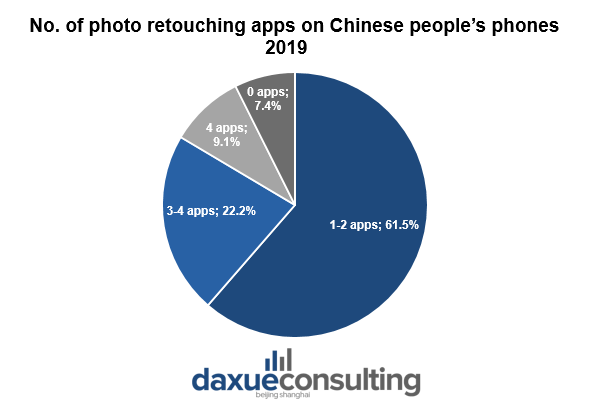
Fitness: home equipment in growing
The “beauty value” economy in China is not only about face, but also the body. Despite some recent pushes from brands like Neiwai to expand the definition of beauty to be more diverse, the pressure for women to be thin remain quite strict. Social media also only exacerbated this trend. In 2016, Chinese social media has seen challenges such as countless women have posted photos of how they can hide their waist behind a vertical A4 sheet of paper.
The pandemic showed the importance of fitness industry. Chinese people didn’t stop exercising: the lockdown situation promoted the growth of smart home devices for fitness. The Chinese market of fitness equipment has increased significantly, sales of smart fitness equipment increased by more than 150% in 2020 after a slow period in 2019.
Key takeaways
- The importance of attractiveness on social media contributed to the growing of the “beauty value” economy in China.
- More and more Chinese people are ready to use aesthetic medicine and modern beauty devices to be attractive.
- Male consumers are an important consumer group, which contributes to the development of the beauty economy.
Author: Valeriia Mikhailova


